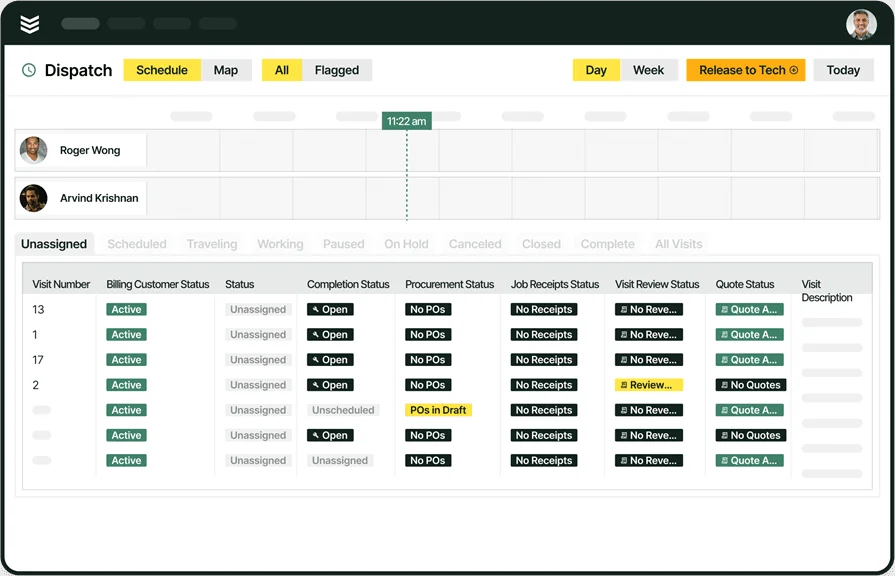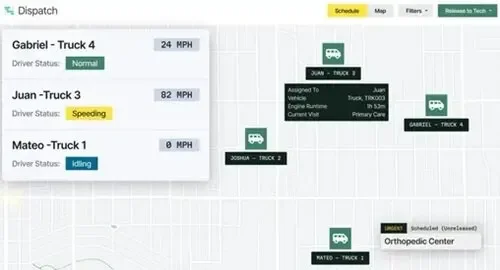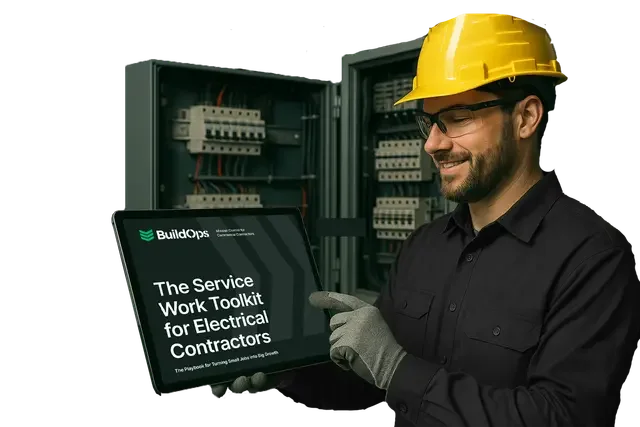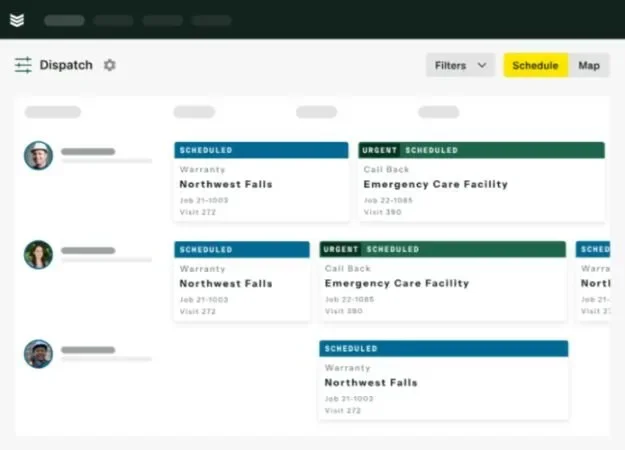When your crew’s out running electrical jobs every day, how you handle scheduling can make or break your entire operation. If you're still juggling paper calendars or clunky spreadsheets, you’re falling behind companies using specialized electrician scheduling software. The right platform gives you control over your jobs, keeps your electricians where they belong — in the field — and helps you grow without the usual headaches.
In this guide, we’ll cover what electrical contractors need to think about when choosing electrician scheduling software, break down the key features that make scheduling easier, and review several top options built for different types of electrical work. We’ll also answer common questions contractors have about adopting software for scheduling their electricians. For those looking to better manage projects, dispatch, and scheduling in the electrical industry, this guide will serve as a resource to get started.
- Choosing the right electrician scheduling software for your team
- 6 features to look for in electrical scheduling software
- Best for commercial electricians
- Best for residential
- Best general contractors
- Other notable electrical service scheduling software options
- 7 benefits of using electrical service scheduling software
- 5 important electrical contractor scheduling software FAQs answered
Before we dive into the top electrician scheduling software choices, let’s go over what contractors should keep in mind when evaluating their options.
Choosing the right electrician scheduling software for your team
Electricians rely on accurate schedules to keep jobs moving, avoid delays, and stay profitable. The software you pick directly affects how well your office staff dispatches crews, how fast jobs get scheduled, and how much downtime your electricians have between calls. Different companies need different solutions depending on job types, team size, and customer base. Here’s what to look at when evaluating electrician scheduling software:
- Cost – How does the price fit into your company’s margins? Are there flexible payment options like monthly or yearly contracts? Can you test it with a free trial or demo before signing up?
- Complexity – How simple is it for your team to assign jobs, filter electricians by skill, and adjust schedules quickly? How long will it take to train dispatchers and field techs? Will it slow the office down or help them schedule jobs faster?
- Customer service – Does the provider offer hands-on setup support and live training? How quickly do they respond to technical issues? Do they give your team guidance on using the software every day?
- Market specialization – Does the platform handle service-based electrical work like installs, repairs, and maintenance? Can it handle both residential and commercial projects? Was it designed specifically for electrical field service jobs?
- Features – Can it group electricians by licenses, certifications, or specialties? Does it provide real-time dispatch updates and mobile access for field techs? Are the features valuable based on your daily workload?
Before reviewing specific electrician scheduling software platforms, let’s break down which features electrical contractors should focus on when comparing these tools.
6 features to look for in electrical scheduling software
Every day, electrical contractors juggle multiple jobs across different locations. Crews handle urgent outages, new installs, inspections, and scheduled maintenance. Without reliable electrical scheduling software, one missed appointment or delayed crew can trigger lost time, frustrated customers, and backed-up projects. The features below help eliminate these problems and keep field service electricians fully booked and moving.
1. Dispatch management
Real-time dispatch tools assign the right electrician to the job as soon as it comes in. With dispatch management for electrical field service jobs, dispatchers can see job schedules, track tech locations, and make changes on the fly when delays happen or emergency calls come through. For instance, when a commercial office calls after losing power to half their floor, the office can reroute the nearest crew equipped to handle electrical panel issues, keeping both customer satisfaction and schedules intact.
2. Customer management
A solid electrical CRM system keeps customer data organized — from contact details to full service histories. Office teams pull up everything they need to schedule jobs fast, while techs review past repairs before stepping on-site. Picture a recurring issue at a warehouse with faulty lighting circuits — your tech checks service notes beforehand, arrives prepared with replacement ballasts, and finishes the repair without needing a second trip.
3. Fleet tracking
Keeping an eye on vehicles helps scheduling stay efficient. With fleet tracking for electrical service contractors, dispatch can monitor truck locations, plan routes, and keep response times sharp. Let’s say a citywide blackout knocks out traffic signals in multiple zones — dispatch can quickly identify which service trucks are closest to each site, sending the right crews out without losing hours in back-and-forth calls.
4. Mobile access for technicians
A dedicated mobile app for field service electricians gives techs instant access to schedules, job details, and updates without needing to stop by the office. For example, when a tech wraps up an EV charger install ahead of schedule, dispatch sees the open time slot and sends out a last-minute service call for a backup generator inspection nearby — keeping productivity up and trucks rolling.
5. Time tracking
Accurate time tracking software for electrical contractors gives clear visibility into job lengths and labor costs. Office staff can review exactly how long tasks take and fine-tune future schedules. For example, if service calls for three-story apartment rewiring consistently run longer than estimated, managers can adjust time blocks to keep the crew’s daily workload balanced and prevent unexpected overtime.
6. Service agreement management
Managing recurring maintenance work becomes simple with service agreements for electrical contractors. Contracts stay organized, renewal dates stay on track, and recurring site visits get scheduled automatically. For instance, when handling quarterly safety checks for a chain of medical offices, the system alerts your team when each property is due, preventing missed inspections and keeping contract revenue steady.
Other valuable features for electricians
While the core features handle scheduling, dispatching, and job management, some additional tools can help electrical contractors simplify even more parts of their operations. These features aren't always required for every company but can bring extra value as your electrical scheduling software needs grow.
- Invoicing and payment processing – Invoicing and payment features allow your office staff and technicians to create, send, and collect payments directly inside the same system used for scheduling. Customers can pay on-site or online by card, ACH, or mobile apps right after service, reducing paperwork, speeding up cash flow, and avoiding long payment delays.
- Sales pipeline management – Sales pipeline tools give estimators and sales staff full visibility into open quotes, leads, and proposals while staying connected to the scheduling system. This helps teams manage follow-ups, close deals faster, and grow revenue without juggling separate systems.
- Reporting and analytics – Reporting software for electrical service companies provides owners and managers with clear data on scheduling efficiency, revenue trends, labor hours, and customer satisfaction. This helps leadership identify bottlenecks, track team performance, and make smarter business decisions backed by real numbers.
Now that you’ve seen the core and advanced features available, let’s break down which electrician scheduling software platforms stand out for different types of electrical contractors, starting with commercial operations.
Best for commercial electricians: BuildOps
BuildOps is designed for commercial electrical contractors handling complex projects, larger teams, and multiple job sites. Its intuitive drag-and-drop scheduling interface allows dispatchers to sort and filter electricians based on skillsets, licenses, and availability, making job assignments fast and accurate.
Customer profiles support multiple properties under a single account, while real-time dispatching, AI-assisted search, and field updates help manage every stage of the job. BuildOps doesn’t just handle scheduling—it connects dispatch, invoicing, reporting, service agreements, and field operations together, keeping every part of the business in sync.
How Pricing Works: Custom pricing available through a demo, annual per-user contract
Features Beyond Scheduling: Real-time dispatching, advanced search, AI-powered notes and reports, invoicing, CRM integration, customer hierarchies, service agreements, field mobile access
What Sets It Apart for Commercial: Built specifically for commercial field service contractors managing multiple property locations, complex projects, and larger teams while keeping everything connected under one platform.

Check out BuildOps Scheduling
We help commercial contractors streamline jobs from initial call to closeout.
Best for residential electricians: FieldEdge
Image Source: FieldEdge
FieldEdge focuses on residential service electricians who manage homeowner appointments, smaller teams, and recurring service calls. The platform includes drag-and-drop scheduling, customer management, invoicing, and mobile access, designed for jobs like home rewiring, panel upgrades, and EV charger installations. It works well for residential companies that prioritize day-to-day service calls but may lack the depth needed for larger commercial projects or highly customized scheduling needs. This may not be ideal for commercial contractors handling multi-property clients or complex construction jobs that require extensive technician filtering and field service workflows.
How Pricing Works: Custom pricing available through quote request
Features Beyond Scheduling: Mobile app for field techs, invoicing, customer history tracking, sales proposals, service agreements, reporting
What Sets It Apart for Residential: Simplifies residential scheduling and service workflows while supporting smaller electrician teams focused on routine jobs
Best for general electrical contractors: Service Fusion
Image Source: ServiceFusion
Service Fusion is geared toward small to mid-sized electrical contractors who need flexibility across different types of work, including residential, light commercial, and service agreements. The system offers scheduling, invoicing, mobile access, payment processing, and job management inside a single platform. While it covers a broad range of functions, it may feel limited for larger teams or complex field operations that require deeper dispatch control and multi-location property management. For contractors needing advanced technician filtering, multi-property client hierarchies, or detailed commercial project tracking, this may not be ideal.
How Pricing Works: Tiered pricing based on features and number of users
Features Beyond Scheduling: Payment processing, job management, invoicing, customer management, reporting, mobile app for field crews
What Sets It Apart for General Contractors: Versatile all-in-one system for small to mid-size teams handling mixed residential and commercial service work
Other notable electrical service scheduling software options
ServiceTitan
Image Source: ServiceTitan
ServiceTitan offers a full platform aimed at larger residential and commercial service businesses, including electricians. It combines scheduling, dispatch, CRM, invoicing, marketing, and reporting inside one cloud-based system. The platform supports large teams with strong customization and integrations but may be too complex or expensive for smaller shops focused on daily service work. However, this may not be ideal for small to mid-size contractors who don’t need extensive enterprise features or larger corporate-level field service management.
How Pricing Works: Custom quote-based pricing
Features Beyond Scheduling: CRM, dispatch board, technician tracking, invoicing, payments, marketing tools, custom reporting, integrations
What Sets It Apart: Enterprise-level field service software with advanced features suited for larger electrical businesses scaling across multiple regions
See how ServiceTitan compares to BuildOps when it comes to their scheduling features.
FieldVibe
Image Source: FieldVibe
FieldVibe is designed for small electrical field service companies looking for simple scheduling and job tracking. The platform focuses on core functions like calendar-based job management, client details, appointment reminders, and task status updates. It’s built to help small teams organize daily routes but may not offer the advanced job costing, reporting, or multi-tech filtering needed for growing companies. Although this may not be ideal for contractors who need complex scheduling, detailed reporting, or field service automation as operations expand.
How Pricing Works: Subscription plans available with monthly rates
Features Beyond Scheduling: Job tracking, calendar management, client data storage, task status updates, reminders
What Sets It Apart: Easy-to-use tool for small teams needing basic job scheduling and daily route planning
ServiceM8
Image Source: ServiceM8
ServiceM8 targets small home service businesses, including electricians managing quick-turn jobs and maintenance visits. It offers scheduling, quotes, invoicing, payments, and limited job management through a mobile-first interface. While efficient for owner-operators or small crews, it may not provide the deeper scheduling control larger field teams require. This software might not suit contractors handling extensive projects with multiple teams or routine upkeep across various sites.
How Pricing Works: Subscription plans based on features and users
Features Beyond Scheduling: Quotes, invoices, payments, job notes, customer communication, field app
What Sets It Apart: Mobile-first design built for very small service companies handling fast, simple service calls
FieldPulse
Image Source: FieldPulse
FieldPulse offers field service management tools for electricians handling both residential and light commercial jobs. It includes scheduling, estimates, job management, invoicing, payments, and CRM features. While it helps simplify daily operations, it may not have the property hierarchy, advanced dispatch tools, or multi-crew coordination required for larger commercial teams. This may not be ideal for contractors who work with complex commercial accounts or require advanced job scheduling logic.
How Pricing Works: Monthly subscription pricing with different feature tiers
Features Beyond Scheduling: Job management, estimates, invoices, payments, CRM, technician notes, reporting
What Sets It Apart: Good option for smaller to mid-size teams juggling both residential and light commercial jobs
Tradify
Image Source: Tradify
Tradify focuses on electricians and tradespeople looking for simple scheduling, quoting, and invoicing software. It offers calendar-based scheduling, recurring job management, quotes, invoicing, and payment processing from one system. While user-friendly for solo operators or small teams, it may not offer the dispatching depth, tech filtering, or large team support that commercial operations often need. It's less than optimal for large field service teams overseeing projects across numerous sites or extensive commercial real estate holdings.
How Pricing Works: Monthly subscription pricing based on users
Features Beyond Scheduling: Job scheduling, quoting, invoicing, payments, recurring job management, job status tracking
What Sets It Apart: Straightforward scheduling and billing platform for small electrical shops focused on routine service jobs

Explore our scheduling tool
Book — and complete — more electrical jobs with BuildOps’ scheduling tool.
7 benefits of using electrical service scheduling software
Electrical contractors deal with tight schedules, emergency calls, job site changes, and customer demands daily. Electrical service scheduling software helps keep operations moving, techs productive, and customers satisfied while giving business owners better control over how every job gets booked and completed.
1. Centralizes customer information
When schedules fill up fast, having every customer’s service history, site notes, and contact details in one place helps the office schedule smarter. With CRM tools for electrical contractors, teams pull up full job histories instantly, helping dispatch assign the right tech, prepare for the job, and avoid return visits due to missing information. This prevents techs from arriving at job sites blind, saving time and cutting down costly mistakes.
2. Speeds up invoicing and payments
Billing doesn’t have to slow down after the job’s complete. With electrical invoicing systems, invoices are generated directly from the completed job record, reducing billing delays and giving office staff immediate visibility into outstanding payments. Faster payments keep cash flow healthy and reduce the need for time-consuming collections.
3. Prioritizes emergency calls faster
When emergency service requests hit the office, software helps prioritize urgent repairs by instantly showing which techs are available and qualified. With electrical dispatch software, dispatchers get real-time visibility into schedules and can rearrange work orders quickly to handle the most critical calls. This allows teams to respond quickly to downed systems, keeping both safety and customer trust intact.
4. Keeps crews fully booked without overloading
Having full visibility into available hours, technician workload, and job types lets the office book jobs more evenly. This balance helps avoid gaps in the schedule while preventing tech burnout from overloaded days packed with complex installs or service calls. Teams stay consistently productive without overwhelming field techs, keeping morale and job performance strong.
5. Reduces costly scheduling mistakes
Double-booked techs, missed appointments, or forgotten service agreements all cost time and money. Scheduling software helps reduce these costly errors by keeping every work order, appointment, and contract automatically organized and assigned. Fewer scheduling errors translate to stronger customer satisfaction and fewer expensive reschedules.
6. Improves bidding accuracy
Accurate scheduling data helps estimators bid smarter. With insights from previous service calls, software connects real job times, labor hours, and travel costs directly into electrical bidding apps, helping estimators build stronger, more profitable quotes. Over time, this leads to tighter margins, fewer underestimated jobs, and improved profitability.
7. Helps plan recurring maintenance work
For contractors managing long-term service agreements, software automatically schedules recurring inspections, equipment checks, and contract visits. This keeps revenue predictable while reducing the risk of missed contract obligations that can affect customer satisfaction. Customers stay loyal when routine service happens on time without constant reminders or follow-ups.

Get the Service Work Toolkit
We help electrical contractors with simplified processes, real-life examples, and templates.
5 important electrical contractor scheduling software FAQs answered
For electrical contractors, efficient job scheduling impacts everything from customer satisfaction to technician workload. Whether you're dispatching emergency repairs, juggling install crews, or managing ongoing maintenance contracts, electrician scheduling software gives both the office and field techs full control of each day’s schedule.
Here are a few other good-to-know bits of information for electricians using scheduling software:
1. What is electrician scheduling software?
Electrician scheduling software is an application that helps organize when and where electricians are dispatched for service calls, installations, and maintenance jobs. This includes knowing at a glance which times and electricians are available, as well as where each specific job site is located.
Electrician scheduling handles when and who is assigned, while dispatch ensures the right technician arrives fully prepared.
2. How do electrical scheduling programs work?
Electrical scheduling software gives office staff full visibility of what jobs are scheduled, who is assigned, and when jobs are happening. Dispatchers choose appointment times based on job type, customer availability, technician skills, and travel distance. Techs receive real-time updates through mobile apps, update job statuses, and sync information back to the office instantly.
3. How much does electrical contractor scheduling software cost?
Entry-level plans may start from $20–$80 per user per month. Full-featured platforms offering scheduling, dispatch, invoicing, CRM, and reporting typically range from $100–$300 monthly per user. Costs vary based on how many users you need, which advanced features are included, and how much setup support is required.
- Number of office staff and electricians needing access
- Extra features like fleet tracking, payments, invoicing, or advanced dispatching
- Onboarding, training, and customer support levels
4. Who needs electrical service scheduling software?
Electrical contractors of every size can benefit, especially those still using manual systems:
- Paper-based calendars or spreadsheets
- Paper job tickets and handwritten notes
- Techs calling or visiting the office for assignments
- Separate lists for technician skills or certifications
- Manually tracking job times, costs, parts, and expenses
- Losing time fixing avoidable scheduling errors
If your operation faces any of these, switching to electrical service scheduling software can tighten up your whole process.
5. What are the best practices for managing electrician scheduling?
To get the most out of your electrician scheduling software, it helps to follow a few simple scheduling best practices that keep your techs productive and your office running smooth:
- Use live dispatch tools to adjust schedules quickly
- Assign jobs by electrician skills and licenses
- Keep customer records up to date for return visits
- Build buffers between jobs to avoid schedule stacking
- Automate appointment reminders for customers
- Use mobile apps for field job updates
- Track job durations to improve future scheduling
- Prioritize urgent or emergency calls quickly
- Check electrician availability before assigning jobs
- Review reports regularly to optimize workloads
Scheduling plays a bigger role than most electrical contractors realize. Whether you’re managing small residential service calls or running multiple commercial crews, getting the schedule right keeps jobs on time, techs fully booked, and customers satisfied. The right electrician scheduling software makes that possible by giving your office and field teams full control over every work order and appointment.
For commercial contractors handling larger field service operations, platforms like BuildOps offer scheduling as part of a full solution that ties together dispatch, invoicing, reporting, service agreements, and mobile access — all built to support the way electrical contractors work every day.

Take a closer look under the hood
Find out how BuildOps can supercharge your electrician scheduling process.







